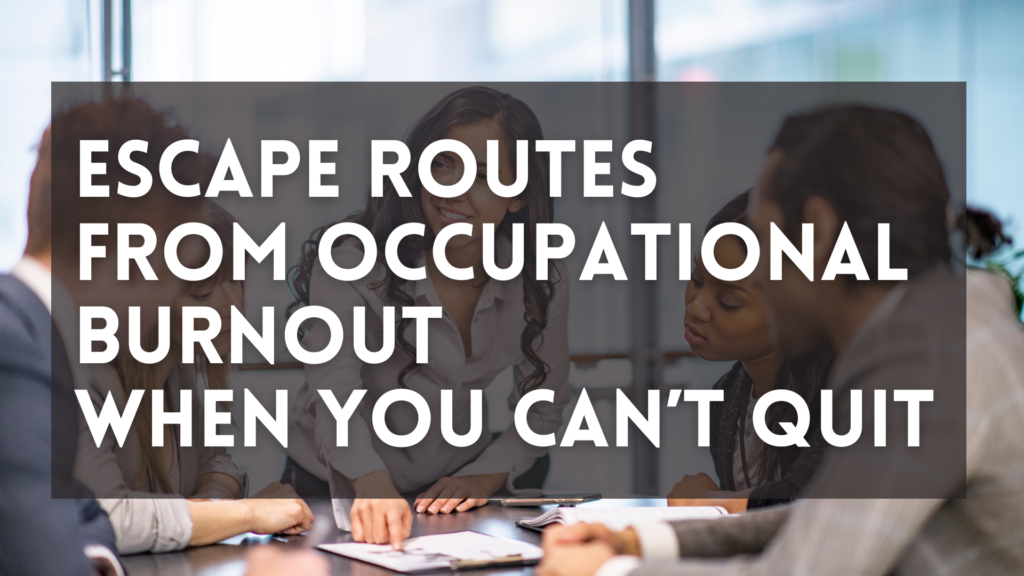
Feeling stuck and dreaming of quitting? It might not be laziness, but job burnout.
When we are living paycheck to paycheck, the fear of job loss can be overwhelming. Yet, if we find ourselves experiencing anxiety and nausea, unable to focus on our work, and our enthusiastic outlook has been replaced by daydreaming about quitting, given the uncertainty of things and the economic turbulence that will follow in our wake, can we afford such a break?
The ever-changing world and ailing economy can’t make any of us resign or be laid off whenever we want. We have to work relentlessly around the clock to make ends meet, juggling multiple tasks and side jobs to be able to cover basic needs and other expenses. Yet, when we unexpectedly find ourselves trapped in the tendrils of procrastination or laziness, rest assured that is not listlessness but rather, we’re grappling with the all-consuming beast known as occupational burnout. And it’s real!
What Is Occupational Burnout

In 20l9, the World Health Organization (WHO) recognized that burnout is now an occupational phenomenon. WHO defines it as a “state of vital exhaustion.” It is “a syndrome conceptualized as resulting from chronic workplace stress that has not been successfully managed.” It also mentioned that it is characterized by three dimensions: feelings of energy depletion or exhaustion; increased mental distance from one’s job, or feelings of negativism or cynicism related to one’s job; and reduced professional efficacy.
The Global Rise of Burnout: From Exhaustion to National Trends
Recently, the United Kingdom has been dealing with a significant issue of job burnout. According to Brian Dow, the Chief Executive of Mental Health UK, a large number of people are taking time off work due to poor mental health caused by stress. Mr. Dow has expressed his concern that the UK may be on the brink of becoming a burnt-out nation.
The 2024 survey of Mental Health UK found out that almost 38 percent or almost four in ten workers have experienced stress as a result of taking on extra work because of the cost of living crisis.
While in the Philippines, a survey conducted by Deloitte in 2023 revealed that occupational burnout is a major concern for Filipino Generation Z and millennial workers. Specifically, the survey found that 70 percent of Filipino Gen Z workers (born between 1997 and 2012) and 63 percent of Filipino millennial workers (born between 1981 and 1996) are experiencing burnout due to “hustle culture” and “rise and grind mentality.”
Furthermore, a study conducted by Milieiu and Intellect revealed that Filipinos work hard for three main reasons. Firstly, to improve their lives and those of their loved ones (58%), secondly, to have a sense of accomplishment (53%), and thirdly, to increase their income (50%).
Globally, the survey also found that the average burnout per country is 45 percent, which marks an alarming increase of 39 percent from 2019. This trend highlights the need for employers to prioritize employee well-being and take proactive measures to prevent burnout.
Tips to Avoid Job Burnout
It can be difficult to deal with occupational burnout, especially when quitting our job isn’t an option due to financial constraints. However, there are some strategies we can try to bring back our energy and confidence. Here are a few escape routes we can consider:
1. Practice Slow Living

Make it a rule to take everything slow. The slow living culture is, according to the website of the Good Trade, all about identifying the values that matter most to us and structuring our time accordingly. Every day, we exhaust ourselves by juggling multiple tasks and living with deadlines. However, we all need to recharge our batteries. Taking even a 5-10-minute break can help refresh our minds and bodies. Take a power nap. By embracing a slow-paced lifestyle, we can have time to think about what matters to us and prioritize it. Never forget to make time for yourself!
2. Develop Emotional Skills
Chasing deadlines, working around the clock, and worrying about what the next day will bring can take a toll on our mental and emotional well-being, leaving us feeling drained. To escape from this agonizing job burnout, it’s time to hit the pause button and recognize our emotions. By working on our emotional skills, also referred to as emotional intelligence, we can figure out what’s causing our emotions and learn how to handle them in different situations.
According to Corporate Wellness Magazine, fostering emotional intelligence (EI) can help address the growing concern of occupational burnout. Ottawa University defines EI as the ability to recognize and effectively manage personal emotions in ourselves and others. One of the key skills of EI is mindfulness. It allows us to shift our preoccupation with thoughts towards appreciating the present moment, and our physical and emotional sensations, and gain a larger perspective on life. Practicing mindfulness, such as exercise, meditation, or journaling.
3. Open Communication

We need to have some boundaries at work if we are experiencing mental and physical exhaustion but are unable to leave our jobs. Boundaries here mean not taking on any more work that would increase the stress levels of our workload. But this is not simply a matter of saying “no.” We must learn to be open about our work situation to our superiors. To be able to do that, we must list down first all our tasks according to the level of importance. Once we have categorized everything, we can then suggest alternative solutions to complete all the tasks without compromising the deadline and distracting the work schedule of our colleagues.
According to Nanette Nussle, MD, a best-selling author and mental health coach, clear and open communication can help reduce employee frustration and improve productivity. She also notes that it “helps in establishing realistic expectations and clarifies roles and responsibilities.
4. Seek support
When we’re feeling overwhelmed with what is happening in both our personal and work lives, it is crucial to be open to the people we trust– the people who will not judge us and whom we can rely on. Let out all our feelings and thoughts to them until we release all that burdens us. The people who care for us can offer a fresh perspective on how to handle our depressive situations.
However, if we don’t have anyone to rely on or no one is available to listen to us, don’t lose hope. This too shall pass. We can seek professional help such as calling the National Center for Mental Health Crisis ((02) 8531 9001), so they can help us to process what is going on with our brain and emotions. Remember we are not alone and asking for help when we need it is a sign of strength and not of weakness.
5. Reframe mindset

When we reach the point where we are mentally and physically drained, as if we are already at a dead end, challenging our negative thoughts can help us prevent burnout. Accept what we can’t control. This will help reduce our stress levels. Positive thinking does not imply that one should ignore negative issues in life; it rather means handling them constructively. According to the Mayo Clinic, positive thinking doesn’t require ignoring life’s less pleasant situations. Instead, it means approaching unpleasantness more positively and productively. The focus is on expecting the best outcome, not the worst. Self-talk is the starting point for cultivating a positive mindset.
Remember, our well-being is important, and it’s okay to take steps to prioritize it. By taking care of ourselves, we may find that our energy and confidence start to return, even amid a challenging work environment.
References:
Domingo, A. (2023, August 3). Are young Filipino employees working too hard? How to deal with burnout. Retrieved from GMI Post: https://www.gmipost.com/article/545510/are-young-filipino-employees-working-too-hard-how-to-deal-with-burnout.html
Llach, L. (2024, January 23). A ‘burnt-out nation’? UK struggles with high levels of stress-related work absence. Retrieved from euronews.next: https://www.euronews.com/next/2024/01/23/a-burnt-out-nation-uk-struggles-with-high-levels-of-stress-related-work-absence
Magazine, C. W. (n.d.). The Role of Emotional Intelligence in Preventing Burnout: Developing Empathy and Self-Awareness at Work. Retrieved from Corporate Wellness Magazine: https://www.corporatewellnessmagazine.com/article/the-role-of-emotional-intelligence-in-preventing-burnout-developing-empathy-and-self-awareness-at-work
News, D. (2019, May 28). Burn-out an “occupational phenomenon”: International Classification of Diseases. Retrieved from World Health Organization: https://www.who.int/news/item/28-05-2019-burn-out-an-occupational-phenomenon-international-classification-of-diseases
Online, O. (2020, October 15). WHY EMOTIONAL INTELLIGENCE IS IMPORTANT IN THE WORKPLACE. Retrieved from Ottawa University: https://www.ottawa.edu/online-and-evening/blog/october-2020/the-importance-of-emotional-intelligence-in-the-wo
Staff, M. C. (2023, November 21). Positive thinking: Stop negative self-talk to reduce stress. Retrieved from Mayo Clinic: https://www.mayoclinic.org/healthy-lifestyle/stress-management/in-depth/positive-thinking/art-20043950
Android: https://play.google.com/store/apps/details?id=com.pinetechsoft.lahatjob&hl=en&gl=US
IOS: https://apps.apple.com/ph/app/lahat-jobs/id6451482363
JOB STORY – LAHAT GROUP – 라핫그룹

